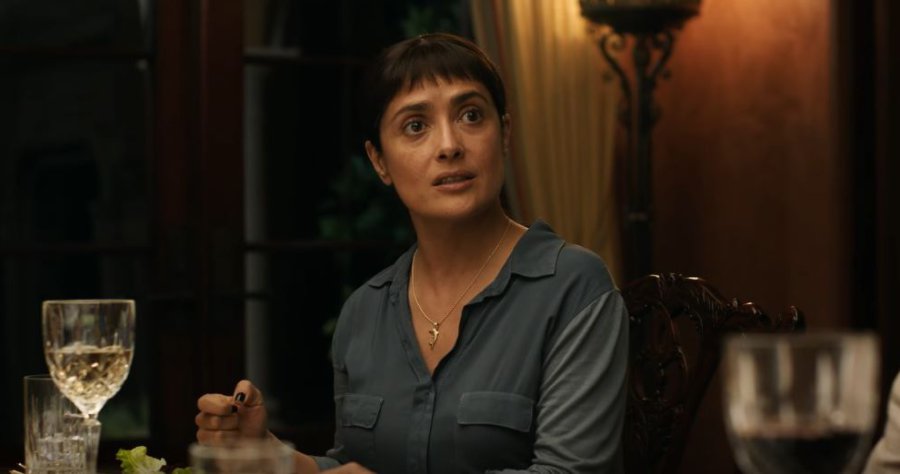By Mark Saldana
Rating: 3.5 (Out of 4 Stars)
As Jean-Jacques Rousseau once claimed that a “great princess” made the infamous statement, “Let them eat cake.” artists and philosophers have often criticized the wealthy for being completely oblivious to the real needs of the impoverished and only concerned with their selfish greed. This has been a theme common in a multitude of stories ever since and has also been a cry of frustration among the victims in the real world. Director Miguel Arteta and writer Mike White’s new film, Beatriz at Dinner, takes this dynamic between the rich and poor and places it in a more modern context. Though the themes are familiar, Arteta and White do exceptional work in developing this disparity into a compelling and earnest argument for real change, though their film never offers any real solutions. Real solutions are difficult to produce, but the time for change is long past overdue.
Salma Hayek stars as Beatriz, a caring and humble holistic healer who spends some of her time offering terminally ill people alternative treatments, and also works as a massage therapist for more wealthy clientele. After a massage session with client Cathy (Connie Britton), Beatriz finds herself stranded at Cathy’s house, as her car is unable to start. Unable to afford the tow back to her home, Beatriz must wait until her mechanic friend can arrive to repair the problem. In the meantime, Cathy takes mercy upon Beatriz and invites her to join a dinner party that she and her husband Grant (David Warshofsky) are hosting for his business associates. At first, Beatriz warmly and lovingly greets party guests Alex (Jay Duplass), Shannon (Chloe Sevigny), Jeana (Amy Landecker), and infamous magnate Doug Strutt (John Lithgow); however, as the wine and alcohol flows and the polite facades wear thin, Beatriz and Doug clash over his unscrupulous business practices and their effects on the impoverished, the powerless, and the environment at large.
Filmmakers Miguel Arteta and Mike White, whose previous collaborations are Chuck & Buck and The Good Girl, prove once again why they make a wonderful team with Beatriz at Dinner. Just like they’re previous movies, this film features exceptional writing and superb character development. This movie is in keeping with Arteta and White’s basic approach to their productions. The film features only a handful of settings and simply focuses on the relationships of the characters as reflected through their behavior towards one another, their dialogues with each other and the behavior once they are separate.
Beatriz is appropriately the real heart of the story and White’s writing, Arteta’s direction and Salma Hayek’s performance make her a truly wonderful and beautiful character. Beatriz represents pure love and how love struggles to survive through the harsh realities of the world and despite the capacity for ugliness humanity has. In addition to her own personal pain, Beatriz must also face and feel the pain of her clients. It is a heavy cross to bear, but one she finds with its own personal rewards. When faced with what she considers to be the personification of evil in Doug Strutt, Beatriz is overwhelmed with hatred and struggles during the night to keep the love in her heart. Arteta and White’s development of this character is absolutely extraordinary and Salma Hayek delivers a performance that better get some recognition during awards season.
One might accuse White and Arteta for the lack of dimension in the hosts and the party guests including the “villain,” Doug Strutt, but that would be a false assessment of White and Arteta’s character development. In fact, these more complicated characters required more work to present them as they should. These are characters with more than one facade and this is clearly shown in the different scenes of the film. The bottom line is that these characters are disingenuous, especially with one another. Smiles and pleasantries abound at the party, but everyone there has an agenda of some sort. The only genuine character is Beatriz who remains somewhat consistent throughout the film, even after a few drinks, though she is much more courageous about what expressing what’s on her mind.
The other cast members deliver outstanding performances of various characters, some more vacuous than others, some more sycophantic or facetious. Besides Hayek, the other real standout is John Lithgow who is truly amazing as the hateful Doug Strutt. From the get-go, he just reeks and oozes arrogance, sleeze and disdain. He is a character that may have had goodness in his heart once, but his drive to succeed and succeed largely has made him a monster-a monster that society often accepts and forgives, but one who manages to destroy and hurt with each new success. He and Salma Hayek share a wonderful chemistry together as genuine foes.
I must also give some solid acknowledgement to Connie Britton and David Warshofski whose performances as Cathy and Grant add another dynamic to the story. They are Beatriz’s connection to the wealthy in this drama, but they offer her more benign and benevolent faces and personalities. This relationship, of course, gets put to the test as the events of the evening devolve. It is truly fascinating to witness how their characters react to the situation.
My only gripe with the movie has to do with the ending of the film. I won’t reveal anything about that, but will state that I did not find it very satisfying. Nevertheless, I still consider Beatriz at Dinner an amazing film and one of the best films of the year. The extraordinary direction, character development, and phenomenal performances make this a movie not to miss. I know it is the season for summer blockbusters, but audiences should give this important little indie movie a chance at big success. It is simply another case where the “little guy” deserves more.
